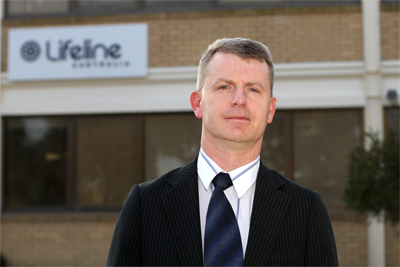Lifeline CIO: security is top priority

Lifeline's newly appointed chief information officer (CIO) Chris Hardy has set himself several ambitious targets with IT, and wants to make security his first priority.

Lifeline CIO, Chris Hardy(Credit: Lifeline)
Lifeline is currently in the trial phase of an online counselling system where around 20 to 30 users can log on between 8pm and midnight and discuss various mental health issues as they would over the phone. According to Lifeline, the service has become so popular that over 80 people a day are looking to log on and chat with counsellors.
In both online chats and phone conversations with Lifeline users, demographic data is collected like geographic region, age, sex and themes of discussions. While Lifeline doesn't record any conversations between counsellors and contacts, it uses this data to better educate staff internally.
"From our perspective, security is the utmost important thing for us. Even though we take unidentifiable data, we still take data," Hardy said. "Any offsite data-hosting, we need to make sure it is secure."
Security concerns don't mean that Hardy won't make use of the cloud, however.
"We're all on premise at the moment but we're investigating different options with [software-as-a-service] and [infrastructure-as-a-service] and what elements within the cloud may benefit Lifeline moving forward," he added.
Past mistakes of other crisis counselling services are still fresh in Hardy's mind after DepressioNET accidentally exposed conversations between counsellors and contacts online. A DepressioNET user discovered her chats while searching her username through Google in 2009.
"We need to make sure that clients who use our service are secure," Hardy said. Preserving Lifeline's reputation is everything to the new CIO.
"[Security needs to be] in everyone's mind all the time, and it's something that we all have to do; protect the mother ship," he said.
Also on Hardy's to-do list is improving service reliability for the crisis management service.
"I think the reliability of our technology and infrastructure is a key element to [improving service]. We need to be ensuring that people, when they do call, they are being presented to one of our telephone counsellors," he said
So ambitious is Hardy that through improved phone and new online contact services, he wants to equip Lifeline to handle nearly double the amount of contacts that it does today.
"We're trying to achieve 700,000 contacts a year within the next two to three years," he said, up from an approximate 450,000 in 2010.
The online chat service would contribute to the ambitious contact numbers, as Lifeline will have the results of its current trial independently audited, and plans to seek funding to run a 24-hour online counselling service on a more permanent basis by September if results are positive.
Hardy said that putting IT back on the radar at Lifeline is important.
"I think the understanding of what the business is trying to achieve and what technology we are providing could always be improved and could always be worked on," Hardy said.
"It's more about ... getting out there and understanding our business and putting a face to IT ... and really making IT in Lifeline a trusted and valued business advisor, not just a service [for] the business," he said. "I need to take the business on a journey."
Hardy has this week been appointed as Lifeline's first chief information officer after a stint at Medibank Health Solutions.
If you or someone you know is experiencing an emotional crisis, call Lifeline on 13 11 14. For more information about Lifeline's services, or to find out about the online trial, go to www.lifeline.org.au.